Senate Passes Second Round of Helene Relief Funding
Over $644 million allocated from Rainy Day Fund
$100 million for water and sewer bridge loans
$50 million for small business bridge loans
Raleigh, N.C. — Today, the North Carolina Senate passed a second Hurricane Helene relief package, allocating another $644 million for storm recovery. When combined with the first relief package, the General Assembly has provided over $877 million for Hurricane Helene relief and over $917 million in total disaster relief for Hurricane Helene, Tropical Storm Debby, Potential Tropical Cyclone 8, and the tornado that hit Nash County.
The package is funded by the state’s Savings Reserve, known as the Rainy Day Fund.
It also provides $30 million to the N.C. Office of Recovery and Resiliency (NCORR) to keep the agency financially solvent. The NCORR informed the legislature this week that due to financial mismanagement, it had blown through its entire budget of $650 million, even as 1,600 victims of Hurricane Florence remain without permanent housing.
“The lack of preparation from the state’s executive branch leading up to Hurricane Helene and absence of immediate action thereafter has left Western North Carolina in a more difficult position than it needed to be,” said Senate Leader Phil Berger (R-Rockingham). “This will be a long recovery, and the legislature will not lose sight of rebuilding the region and fixing the damage. Our second relief package puts the General Assembly’s total commitment so far at almost $900 million, and that will only grow as we continue to evaluate and repair the damage.”
The funding measures and policies in the second Hurricane Helene relief package include:
Funding
- An additional $75 million for the state and local match for federal disaster assistance programs.
- $100 million to the Local Government Commission to assist with local government cashflow needs.
- $100 million to the Department of Environmental Quality (DEQ) for water and sewer bridge loans.
- $50 million to state agencies and local governments for unmet needs not covered by insurance or available federal aid.
- $22 million to the DEQ for bridge loans for infrastructure repair and the testing of underground storage tanks.
- $50 million to Golden LEAF for small business loans.
- $10 million for the state and local match for Potential Tropical Cyclone 8 (PTC-8) and Tropical Storm Debby.
- $50 million for uninsured and non-FEMA reimbursable expenses for school building repair and renovation.
- $5 million to replace and repair K-12 student and teacher technology and devices.
- $10 million to provide weatherization services to homeowners impacted by Hurricane Helene.
- $5 million to Emergency Management to adjust floodplain mapping in Western North Carolina.
- $9 million for utility assistance to individuals impacted by Hurricane Helene.
- $10 million to Smart Start to help childcare providers reopen their facilities.
- $3 million to support children in foster care and children in child protective services.
- $5 million to the Economic Development Partnership of North Carolina to advertise and encourage tourists to return to Western North Carolina municipalities that are ready for visitors.
- Funding for emergency scholarship grants for students at impacted community colleges ($10.5 million), UNC System schools ($5 million), and private colleges ($1 million). Students at eligible community colleges, UNC System schools, and private colleges will be able to receive a scholarship grant of up to $2,500.
- $5.5 million for UNC-Asheville to cover tuition for the spring 2025 semester.
- $5 million to cover spring 2025 tuition for students at A-B Tech, Blue Ridge Community College, Haywood Community College, Mayland Community College, McDowell Community College, and Western Piedmont Community College.
- $500,000 for anticipated additional Line of Duty Death claims.
Policies
- Allows the State Superintendent to approve additional school calendar flexibility in the most impacted school districts (up to 20 additional waived days).
- Waives the charter school lottery for students who temporarily attend a different school so they can reenroll in their original charter school.
- Allows the DEQ to authorize emergency water and sewer loans for Helene damage without standard Local Government Commission approval.
- Allows the DEQ to waive typical 2% administrative fees for water and sewer emergency loans during a disaster.
- Exempts the local match requirement temporarily for Job Development Investment Grants in impacted areas.
- Requires the DMV to extend emissions inspection licenses in the disaster area.
- Authorizes local governments to contract with qualified third-party engineers and architects to assist with inspections and allows permit applicants to contract directly with third-party inspectors.
The Senate also passed a local bill requiring 13 county boards of elections to open at least one early voting site for every 30,000 registered voters. This will only apply to the counties identified by the State Board of Elections in its Oct. 7 resolution. The requirement is similar to a 2020 memo issued by the executive director of the State Board that required counties to open up early voting sites based on the county’s population of registered voters.
